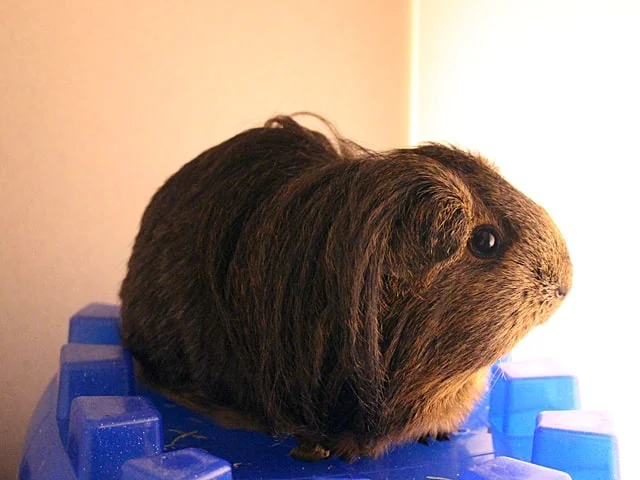
Guinea pigs are neither native to Guinea nor biologically related to pigs, but there is nothing contradictory about these little nuggets of cuteness and the love they have to give their pet owners. While these short-tailed rodents are known to be friendly, tame and easy to care for, before you sign the adoption papers, let’s get to know a thing or two about Guinea pigs.
Guinea pigs are sometimes called “cavies,” and while they’re on the larger side for rodents, they’re still pretty small. A fully-grown Guinea pig is about eight to 12 inches and weighs less than three pounds. Just because Guinea pigs are on the tiny side doesn’t mean they don’t require as much time, energy and commitment like any other pet.
There’s no place like home
“Give me a home where the Guinea pigs roam” … oh, wait. Wrong song and lyrics, but the right concept. Guinea pigs need enough space to wander with separate areas to sleep, go to the bathroom and eat and drink. The more space, the better—and the cage size should increase depending on the number of Guinea pigs you have.
Cages must be lined with a generous supply of shredded newspaper or commercial nesting material but be sure it’s nontoxic. Stay away from cedar chips or sawdust, both of which could cause serious health problems. Cages need to be spot cleaned daily and thoroughly washed a few times a week.
Guinea pigs are intelligent explorers, so providing tunnels to crawl through and platforms to climb helps keep them amused. You can also create a safe playpen area outside their cage for when they need to stretch their boundaries.
Food glorious food
Did you know Guinea pigs can’t manufacture their own vitamin C? Be sure to use commercial Guinea pig food enriched with vitamin C to provide these dumplings with what they need. Guinea pigs also need plenty of high-quality hay to keep their digestive tracks functioning as they should. You can supplement your Guinea pigs’ diet with carrots, dark green lettuce, cucumbers and some fruit. Remember to introduce new foods slowly and in small amounts. Always keep fresh water available and use a water bottle that attaches to the cage and is suspended.
Hair comes trouble … not really
Grooming Guinea pigs is straightforward. They need routine nail clipping, occasional ear cleaning and bathing, and coat brushing. Short-coated breeds typically don’t need to be brushed more than once a week, and longer-coated breeds should be brushed a few times a week to prevent matting.
Handle with care
Guinea pigs are easily stressed and require a gentle touch. Let your Guinea pig sniff your hand for a bit and use a calm, quiet voice, so they don’t get startled. Guinea pigs don’t mind being picked up but use two hands and snug them close to your chest, so they feel secure. A squirmy Guinea pig can fall, which could lead to serious health issues. The more you handle your Guinea pig, the friendlier and tamer it will become. And, just like with any other pet, children should always be supervised around a Guinea pig.
Behavior ins and outs
Some Guinea pigs are on the shy side, and others are fearless. No two Guinea pigs are alike, and the same goes for their breed. Just because two Guinea pigs look similar doesn’t mean they behave the same. Before adopting a Guinea pig, spend time interacting with them to check out their personality traits.
“Social animals” and “enjoys people and other animals” are just two descriptions of Guinea pigs. These critters love to have their heads scratched, and while they don’t actually purr like a cat, they do make a similar sound to show their appreciation for the attention. Plus, when Guinea pigs are happy and excited, they toss themselves in the air, which is called “popcorning” (for obvious reasons) and can kick out their front and back legs. That must be a sight!
If you’re looking for an affectionate companion, maybe a Guinea pig is for you—and the League has plenty! Now through July 31, you can name your own price for these tiny bundles of love and joy!
To learn more Guinea pigs, visit ddfl.org/resource/guinea-pigs and visit ddfl.org/adoption to see available Guinea pigs at the League.
